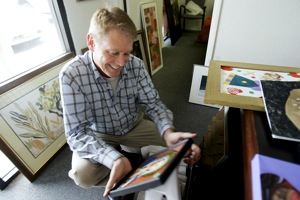-
- Georgia Chief Justice potential nominee for U.S. Supreme Court
- Washington expands domestic partnership law
- Delaware rejects anti-discrimination bill
- Co-founder of HIV/AIDS network recalls effort
- Wisconsin high court to review 2006 same-sex marriage ban
- Nevada endorses domestic partnership bill
- National News Briefs
- World News Briefs
national
Co-founder of HIV/AIDS network recalls effort
One man’s interfaith mission toward understanding HIV/AIDS
Published Thursday, 21-May-2009 in issue 1117
TUCSON, Ariz. (AP) – AIDS is cruel. Scott Blades learned that as a young man. But as he got older he realized something else – maybe God isn’t.
Today, Blades leads a coalition of 39 congregations, the Tucson Interfaith HIV/AIDS Network, which he co-founded in 1994.
A little more than 20 years ago, he wouldn’t set foot in a church if he could avoid it.
“I did not have a good perception of religion,” Blades said.
Blades, 44, grew up in Mesa. He didn’t belong to a churchgoing family, but sometimes his parents would send him to services with neighbors.
He didn’t buy it.
To Blades, religious types could be exclusive, holier-than-thou – even hypocrites.
Complicating his views on faith, Blades came to realize he is gay.
“And as a gay kid growing up in a conservative community – it was tough,” he said.
But not as tough as what came next. His best friend, Jerry, was diagnosed with AIDS in 1985. Blades was 20 years old.
Then Blades saw his assumptions about organized religion realized: Jerry’s family rejected him; his father was a pastor.
“I thought, ‘How could someone reject their own son?’”
Jerry died about a year later. Blades moved on as best he could.
Not long after graduating from Arizona State University, Blades moved to Tucson. He had a good job working in an attorney’s office, a nice car and a steady relationship. He was planning to apply to law school.
But something was missing.
“I wasn’t as happy as I wanted to be. There was no connection to anything bigger.”
Blades dropped everything. He quit the job, left the relationship, sold his house.
Blades joined a support group for members of the gay, lesbian, bisexual and transgender community. It was a good fit, he thought, but “unfortunately it happened to meet in a church.”
Still, it was a pretty good crowd. Some members even attended the church – St. Francis in the Foothills – and they weren’t half bad. Blades thought he might try attending services.
He found what he never knew he’d been looking for.
“Not the expectations of my youth,” he said, “but a bunch of people walking the road together, trying to figure it all out.”
Then his journey to faith came full circle. One day during church, a man stood up and addressed the congregation.
“I have AIDS,” the man said, “And I need help.”
The congregation rallied behind the man, offering support. Members of the church helped care for the man until his death.
“’This is exactly what should happen,’ I thought. The light bulb went off in my head.”
Blades helped organize a training session at St. Francis and another church in conjunction with University Medical Center about how to care for people with HIV/AIDS.
Having an event involving two congregations was great, but “shouldn’t there be more?” he thought.
During the summer of 1994, Blades and the other organizers planned another meeting, one they hoped would kick-start an interfaith movement toward understanding HIV/AIDS.
They invited 450 churches, synagogues, mosques and other faith communities in Tucson to send representatives, Blades said.
Only five people showed up.
But those five became founding members of the Tucson Interfaith HIV/AIDS Network.
Today, the network encompasses hundreds of volunteers and has provided service over its past 15 to at least 700 people living with HIV/AIDS.
Georgeannie Llamas, 57, was diagnosed with HIV in 1997. Today, she is living with AIDS.
After her diagnosis, Llamas said she didn’t want to talk to anyone about her condition. She said people in her apartment complex who knew about it would avoid her and her family.
“You know how people treat you?” she said. “Like they’re afraid …. It was very hard. You can only take so much rejection.”
But Scott and the network “changed her life,” she said.
“I saw the warmth there. I got hugs. I decided it was time to move on,” she said.
Now Llamas, who has five adult children and six grandchildren, gives regular talks at schools and churches through TIHAN about living with HIV/AIDS.
And she gives Blades much of the credit.
“My gosh, that man just works endlessly,” she said. “He’s always the last person to leave. He’s out there (after official functions) in his dress shirt and pants vacuuming and mopping the floors and not leaving until two o’clock in the morning.”
“He’s like our commander in chief.”
|
|
Copyright © 2003-2025 Uptown Publications


